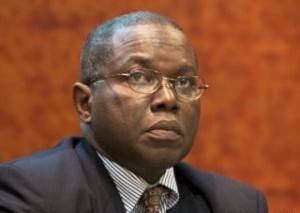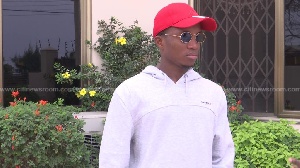- Home - News
- TWI News | TV
- Polls
- Year In Review
- News Archive
- Crime & Punishment
- Politics
- Regional
- Editorial
- Health
- Ghanaians Abroad
- Tabloid
- Africa
- Religion
- Election 2020
- Coronavirus
- News Videos | TV
- Photo Archives
- News Headlines
- Press Release
General News of Thursday, 20 February 2014
Source: The Enquirer
Dr. Nii Moi Thompson speaks on CPP, economy, other issues
The latest addition to President John Mahama’s government, a renowned economist, Dr. Nii Moi Thompson, has opened up to The Enquirer about allegations over crossing party lines as well as his views on the state of the Ghanaian economy.
Dr. Thompson, who was appointed in November 2013 to replace outgoing Dr. Cadman Mills, was the senior economic advisor and acting deputy resident representative for programmes at the United Nations Development Programme in Pretoria, South Africa. He had also worked as chief technical advisor to the ILO in Ghana and Sierra Leone, as well as World Bank consultant in Liberia. He was a member of the UN Country Team, the UN's highest decision-making body in its host countries, in all three countries.
The once head of research for the Convention People’s Party (CPP), has come under heavy criticism in some quarters for joining the NDC government. He responded to the charge:
“People like me unavoidably find ourselves wearing two hats – that of a technocrat and that of a party person. Where do you draw the line in making career decisions? Is it okay for me to make my skills and knowledge available to foreign governments, but not to my own because my party is not in government?”
He said he does not regret the decision to join the Mahama team. “You join a party out of some conviction, not as a vocation. I cannot belong to a party professionally. As an economist, I need professional satisfaction somehow, even if that means working for less money. And that’s what I did. It was a choice between the UN and Ghana, so why should I be crucified for that? Aren’t we always asking Ghanaians abroad to come home and help build Ghana,” he queried.
“Accepting the president’s invitation to be his advisor is one of the best decisions I have ever made. I have no regrets. None. I am happy to serve my country,” he emphasized.
Did he inform his party about decision?
“I informed a few key officials, yes,” he said, “more as a courtesy than an obligation. I consider this a personal career move more than anything else …so it was a courtesy thing. And they wished me well. I have no ill-will and they showed none towards [me]. We are good. There are individual members that are unhappy, but then we all have to live with the choices we make in life.”
Other CPP bigwigs have worked in various capacities for the NDC government. Dr. Kwaku Safo was chairman of the Electricity Company of Ghana (ECG) board while Prof. Agyemang Badu Akosa serves on the National Development Planning Commission (NDPC). The former Finance Minister, Dr. Kwabena Duffuor, also came from the CPP and was at one time head of the Party's Finance Committee.
Dr. Thompson is the first high ranking economist in the Mahama government, besides the vice president, Paa Kwesi Amissah-Arthur, who is a former economics lecturer, deputy finance minister and more recently Governor of the Bank of Ghana. The two of them are expected to spearhead the president’s economic agenda.
Talking Economics
On the recent developments in the economy and cedi in particular, Dr. Thompson said; “it was only a matter of time… the malfeasance in the currency markets were like a tumor that just kept growing. We had to remove it or be consumed by it. And like any surgery, it has been painful somehow, but after the pain comes the recovery, and then good health. The process itself may not be perfect, but we have to keep our eye on the ball”.
He was quick to add, however, that the malfeasance “did not cause the crisis, but aggravated it”. He said the crisis was partly the result of external factors, such as the collapse in the price of cocoa, as well as inappropriate development policies “over the decades”.
He viewed the crisis as an opportunity for the country to evaluate what it has been doing wrong over the years and chart a new policy course for better results.
“We have not deviated much from the colonial and neo-colonialist structure of the economy and that’s the price we are paying.” He said although the economy has witnessed some sectoral change in the decades since independence, “it has not experienced any structural transformation, where resources would move from less productive sectors to more productive ones, hence the low quality of employment and low incomes in the country and the vulnerability of the economy”.
According to him, Ghana’s “agriculture value-added,” for example, is less than the average for lower and upper middle income countries while its food import bill is higher than those countries.
“Low productivity and low production paired with high consumption and an expanding appetite for imports – that’s unsustainable, a recipe for disaster. We must change course, and the time to do that is now,” he stressed.
“We have deferred the hard decisions for dealing with these contradictions for far too long. Perhaps, it was good we had this crisis; it should force us to make those hard decisions, including extensive institutional reforms which we deferred for political or other reasons,” he concluded.











